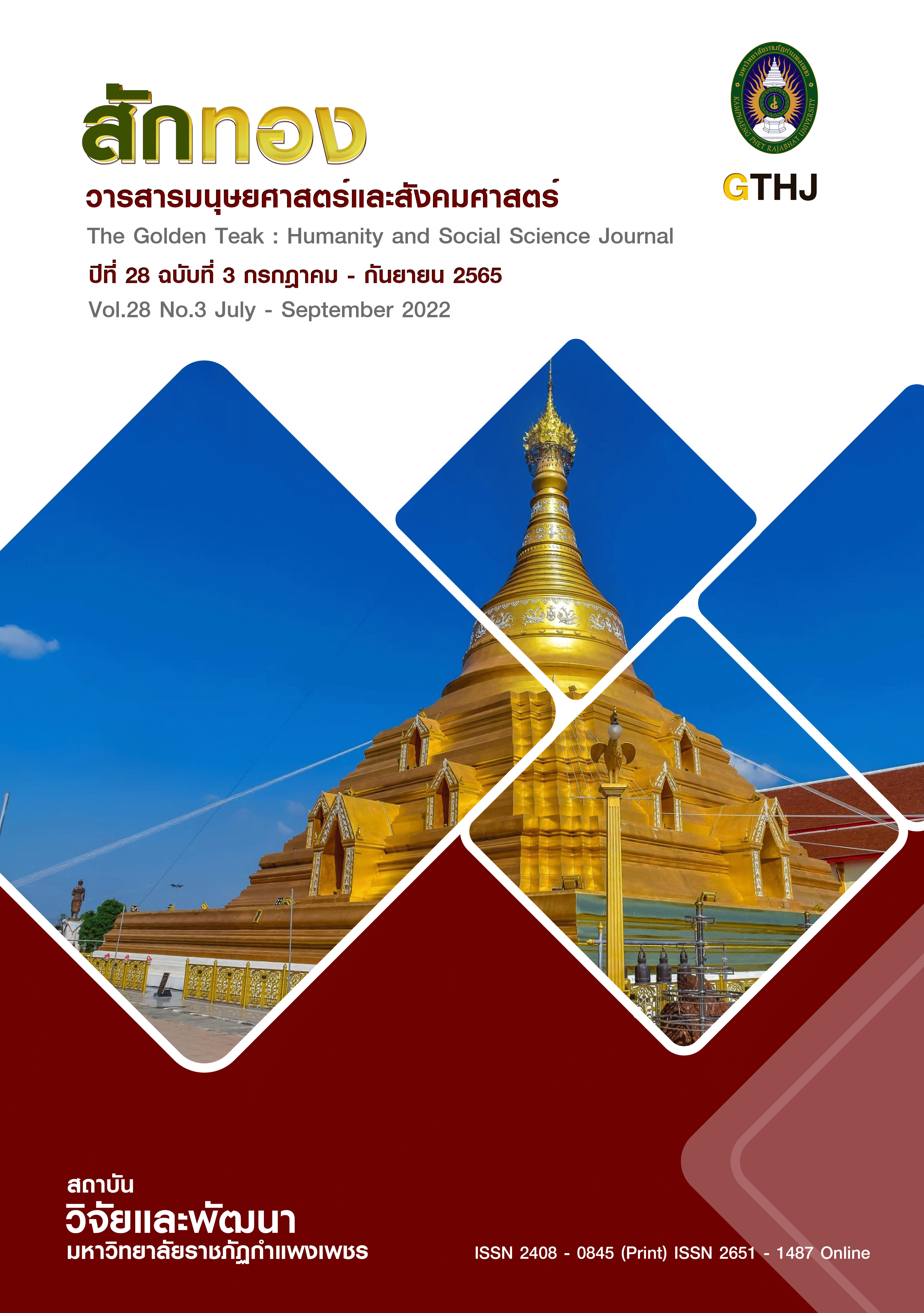Experience of Gender Identity Discrimination Against and Attitudes toward Gender Role of University Students Attitudes toward Gender Role of University Students
Main Article Content
Abstract
The purpose of this research was to study the experience of being discriminated against on the basis of gender identity and the attitudes toward gender roles of male and female students at the university. A sample of 850 students was systematically randomized. Data were collected using questionnaires. Data were analyzed using descriptive statistics tested on experiences of gender identity discrimination using chis-Square statistics, the differences in attitudes about gender roles of male and female students were analyzed using Mann-Whithney U Test statistics. The results showed that the mean age of the sample was 20.84 years (S.D.=1.48), 26.6% had been discriminated against on the basis of gender identity, i.e., indecent words and behaviors were used (13.9%). LGBTQ people are 3.51 (OR=3.51; 95% CI=2.53-4.88) more likely to be discriminated against based on gender identity than those who are heterosexual. Males had high scores toward attitudes about gender roles that reflected more traditional gender role attitude than females on four dimensions (roles of Thai men and women in the family, roles of Thai women and men in the community/work, power relations and sexual relationship) (p<0.05). Universities should define their vision of promoting gender equality, for example by including gender equality content in teaching. Educate about the Gender Equality Act E.B. 2558 and a variety of activities related to the promotion of gender equality in university.
Article Details

This work is licensed under a Creative Commons Attribution-NonCommercial-NoDerivatives 4.0 International License.
บทความที่ได้รับการตีพิมพ์เป็นลิขสิทธิ์ของวารสาร สักทอง : วารสารมนุษยศาสตร์และสังคมศาสตร์ สถาบันวิจัยและพัฒนา มหาวิทยาลับราชภัฏกำแพงเพชร
ข้อคิดเห็นใดๆ ที่ปรากฎในวารสารเป็นวรรณกรรมของผู้เขียนโดยเฉพาะ ซึ่งมหาวิทยาลัยราชภัฏกำแพงเพชรและบรรณาธิการไม่จำเป็นต้องเห็นด้วย
References
Boonbaichaipruk, S. (2003). Human rights and gender equality. The personal academic study is a part of the office of the constitutional court’s seminar program.
Chittanont, M., Naressenie, K., & Thuvanuti, P. (2018). Cooperation and integration approach for prevention of adolescence undesirable pregnancy base on collaborative public management. Journal of Research and Development Institute Rajabhat Maha Sarakham University, 5(1), 359-368.
Department of Women's Affairs and Family Development, Ministry of Social Development and Human Security. (2017). Standard and index of gender equality. Bangkok : MHDSH Press.
Department of Women's Affairs and Family Development, Ministry of Social Development and Human Security. (2021). Stepping into its fifth year, where does the Gender Equality Act go?. [Online]. Available : https://www.sdgmove.com/2020/05/05/gender-equality-act/ [2021, August 21].
Dotti Sati, G.M., & Quaranti, M. (2017). The best is yet to come? Attitude toward gender roles among adolescents in 36 countries. Sex Roles, 77, 30-45.
Hajnalka, F. (2014). Gender role attitudes among higher education students in a borderland Central-Eastern European region called ‘Partium’. Center for Education Policy Studies Journal, 4(2), 49-70.
Kharouf, E.A., & Daoud, N. (2019). Gender role attitudes among higher education students in Jordan. Mediterranean Journal of Social Science, 10(4), 63-75.
Lobber, J. (2017). The variety of feminisms and their contribution to gender equality. [Online]. Available : http://diglib.bis.uni-oldenburg.de/pub/unridden/ur97/kap1.pdf [2021, 13 August]
Mahiwan, P., & Ayuwat, D. (2019). Factors associated to the gender role socialization of working women : a case of major city, Thailand. Journal of Social and Political Science, 2(3), 554-561.
Musumari, P.M., Tangmunkongvorakul, A., Srithanaviboonchai, K., Yungyuankul, S., Techasrivichien, T., Suguimoto, SP., Ono-Kihara, M., Kihara, K. & Chariyalertsak, S. (2016). Prevalence and correlates of HIV testing among young people enrolled in non-formal education centers in urban Chiang Mai, Thailand : A cross-sectional study. PLoS One, 11(4), e0153452.
Pinyaphong, J. (2014). Perceptions of sex roles among colleague male and female students in Uttaradit province. Research report for UNFPA. [Online]. Available : http://thailis.or.th/tdc/ [2021, August 21].
Pinyaphong, J., Srithanaviboonchai, K., Chariyalertsak, S., Phornphibul, P., Tangmunkongvorakul, A. & Masumari, PM. (2018). Inconsistent condom use among maleuniversity students in North Thailand. Asia-Pacific Journal of public health, 30(6), 147-157.
_______. (2018). Predictors of condom use among heterosexual male university students in North Thailand using a psychological factors model. Southeast Asia Journal of Tropical Medicine and Public Health, 49(3), 489-501.
Poosanasuwansri, D. (1997). Factors influencing premarital sex among adult learners of lower secondary level, Bangkok Non-formal education center. Master Thesis, Mahidol University.
Rungreangkulkij, S., Kotnara, I., Kaewjanta, N. & Kabkumba, C. (2017). University students’ attitude towards gender in Thai society. Journal of Social Science and Humanities, 43(2), 84-114.
Tangmunkongvorakul, A., Carmichael, G., Banwell, C., Seubsman, SA. & leigh, A. (2012). Coital experience among adolescents in three social-educational groups in urban Chiang Mai, Thailand. Asian Population Studies, 8(1), 39-63.
United Nation Development Programme, UNDP Asia-Pacific Regional Center. (2014). Being LGBT in Asia: The Thailand Country Report. Bangkok : UNDP.
United Nation Thailand. (2019). Our work on the sustainable development goal in Thailand. [Online]. Available : https://thailand.un.org/en/sdgs [2021, August 21].
Women and Men Progressive Movement Foundation. (2019). Attitudes of Thai women towards Songkran Festival 2017. [Online] Available : https://mgronline.com/qol/detail/9610000032691 [2021, August 21].


